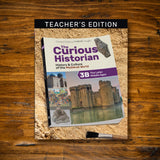- Description
- Specifications
- Contributors
- Support
-
Curious about how to teach this text? Visit our FAQ page for suggested schedules, tentative release dates for the rest of the series, and much more!
A one-semester course for grades 7 and up
The Curious Historian Level 3 is the third part in a 3-level series that presents the study of history and culture from the beginnings of civilization (Mesopotamia and Egypt) through the Middle Ages and the Renaissance. Students will grow excited about history, see how people throughout the ages were both similar to and different from themselves, and learn to be scholars of the past who can make a difference in the future. The Curious Historian Level 3B: Late Middle Ages and Renaissance (TCH3B) introduces students to:
- Unit I: The High Middle Ages
- European society after 1066
- The Crusades
- Byzantium, the Muslim world, Outremer
- Western Christendom in the high Middle Ages
- 12th- and 13th-century renaissance and renewal
- Unit II: The Empires of the East
- China’s Song, Ming, Qing dynasties
- The Mongol and Mamluk Empires
- Islamic Empires: the Ottoman, Safavid, and Mughal
- Medieval Japan
- Unit III: The Renaissance and Reformation
- Masters
- Crises of the 14th and 15th centuries
- The Renaissance and the New World
- The Reformation
- Reactions to the Reformation
The Curious Historian teacher’s editions include detailed teacher notes and tips, a suggested weekly schedule, answer keys for all exercises, and sample responses and prompts for the discussion questions.
Bonus Digital Resources for Level 3B is a collection of PDFs which is complimentary when you purchase The Curious Historian Level 3B Program (or available for purchase separately). These digital files can be printed and either distributed to students or displayed in the classroom:
- The Curious Historian Level 3B Quizzes (PDF) and Answer Key (PDF)
- “Four Categories of Virtues (and Vices)” chart (PDF) from TCH3B appendix C
- The “Spotlight on Virtue” discussion questions (PDF) from TCH3B appendix C
- Reference Archive charts indexed in TCH3B appendix F
Plus: A supplemental Go Deeper PDF will be available to view for free! This resource includes additional information to share with your students or explore for your own interest: fun tidbits, links to museum collections of artifacts, links to virtual tours of medieval ruins and other key sites, and much more. Icons in the teacher’s edition indicate when to reference this optional resource.
“We believe that history is about more than memorizing dates, reciting lists of kings and emperors, and remembering who won which battle in wars that changed the world forever. History is also the study of the people who lived during those events. From the beginning of recorded time, people have invented new ways to do things, created beauty in dreary places, and erected buildings and monuments that continue to inspire us. Some of these people became well-known figures and others were ordinary men and women like you and me. But all of us are part of the greater tree of humankind, and we each need to know what our part is as a leaf upon that tree. Without an understanding of the past, we will be less equipped to live in the present and plan for the future.” —Dr. Christopher Perrin
Paperback
ISBN: 9781600516733
Pages: 640
Dimensions: 8.5in x 11in
-
Elisabeth G. Wolfe PhD, Author
A resident of central Texas, Elisabeth G. Wolfe teaches courses in literature and art appreciation online for the Baptist University of Florida. She is also a freelance translator, and she writes historical fiction, with five novellas currently in print. Her publications include a translation of The Apostolic Fathers: An Introduction (Wilhelm Pratscher, ed., Baylor University Press, 2010) and the essay “Þaȝ Hit Displese Ofte: Monastic Obedience in Patience,” which was the lead article in the Summer 2013 issue of Christianity and Literature. Recently, Dr. Wolfe and her writing partner, Enola G. Freeman, released Sister Muses, a short story anthology. Dr. Wolfe studied at Baylor University, earning a BA in Chemistry and German and a PhD in Religion and Literature. Her dissertation focused on the influence of Saint Bernard of Clairvaux on the anonymous fourteenth-century poems in the manuscript Cotton Nero A.x, but she enjoys the Anglo-Saxon era as well. Her other interests include the Inklings, Texas history, classic film and television, a number of fandoms, and music from before 1976. Ashlee Cowles MLitt, MTS, Author

Ashlee Cowles taught philosophy, religion, history, literature, and writing at the secondary and college levels for a decade. She fell in love with classical education after spending an entire semester reading and discussing Homer’s Iliad with her ninth-grade students. In partnership with her lifelong friend and coauthor, Danielle Stinson, Mrs. Cowles has written two historical novels about the Trojan War for adults under the pseudonym A. D. Rhine: Horses of Fire and Daughters of Bronze (Dutton/Penguin-Random House, 2023 & 2024). She has also written several young adult novels, including The Poppy and The Rose (Owl Hollow Press, 2020) and Beneath Wandering Stars (Simon & Schuster, 2016). Mrs. Cowles pursued graduate studies in theological ethics at Duke University and medieval history at the University of St. Andrews in Scotland, where she wrote her master’s thesis on the humanism of the twelfth-century writer John of Salisbury, whose work influenced liberal arts education during the Middle Ages. In addition to writing historical fiction and K-12 curriculum, Mrs. Cowles is a copywriter for the education sector. She lives among the wild beauty of northern Michigan with her husband and children.
Paul Stephenson PhD, Author

The author or editor of ten books, Paul Stephenson most recently published New Rome: The Empire in the East (Harvard University Press, 2022), which was named a top 25 history book of the year by The Times (London). A historian of Greece, Rome, and Byzantium, Dr. Stephenson studied at Cambridge University before being appointed to a fellowship at Keble College, Oxford University. In the past three decades, he has held teaching and research posts at universities, museums, and research institutes in seven countries, including four professorial chairs (Wisconsin, Durham, Nijmegen, Lincoln). His research has been supported by the British Academy, Dumbarton Oaks (Trustees for Harvard University), the Humboldt Foundation, the National Hellenic Research Foundation, the Metropolitan Museum of Art, the Onassis Foundation, Princeton University, the Swedish Collegium for Advanced Study, and the University of California.
Courtney Fu PhD, Author

A scholar of Chinese history and culture, Courtney R. Fu specializes in women’s history and Chinese fashion in the modern to contemporary eras. She currently teaches at the National University of Singapore, Singapore University of Technology and Design, and Lasalle College of the Arts. She obtained her PhD in History and Asian Studies from the Pennsylvania State University in 2017. Since returning to Singapore, Dr. Fu has worked on reconstructing Singapore's fashion history and was awarded a research grant from the government in an effort to establish the fashion heritage of the country. She has published numerous articles, such as “New Fashion Identity and the State in China: A Decolonial Interpretation,” in both sinology and fashion studies journals. Dr. Fu’s students come from all disciplinary backgrounds, and her greatest joy in teaching is helping students discover fashion in Chinese and Asian histories.
Craig Benjamin PhD, Author

Craig Benjamin is Professor of History Emeritus at Grand Valley State University in Michigan. His books include Big History: Between Nothing and Everything (McGraw-Hill, 2014); Volume 4 of the Cambridge History of the World (Cambridge University Press, 2015); Empires of Ancient Eurasia. The First Silk Roads Era 100 BCE–250 CE (Cambridge University Press, 2018); The Routledge Companion to Big History (Routledge, 2019); and Traditions and Encounters: A Global Perspective on the Past (McGraw-Hill, 8th edition forthcoming, 2025). Dr. Benjamin has also published numerous articles and chapters on world history and big history, which is the study of the history of not just humanity but of the whole universe. He has recorded several programs and courses for the History Channel and Great Courses and has worked as a consultant for the College Board for many years, designing exams for the SAT and AP World History programs. Recently retired from university teaching, Dr. Benjamin is now a frequent lecturer on cruise ships all over the world, including for Scientific American and New York Times Journeys, and on land and air tours for the Smithsonian Institute.
Michael C. Brose PhD, Author

Professor of Practice in Central Eurasian Studies at Indiana University Bloomington, Michael C. Brose researches and teaches about the history of interactions between imperial Chinese states and their pastoral nomadic neighbors who lived in the steppe. Those interactions teach us that nomads could and sometimes did form powerful, complex empires that were certainly the equal to some of their Chinese neighbors, and that those nomads were anything but uncivilized barbarians. Dr. Brose’s focus on the history of the paramount nomadic steppe empire in history, the Mongols led by Genghis Khan, also shows us how their rule ultimately changed China into the multi-cultural and multi-ethnic state and society that it is today—the topic of his book Subjects and Masters: Uyghurs in the Mongol Empire (Western Washington University, 2006). He hopes that students will remember that nomads played very important roles in human history because they always lived near or next to settled farming communities, and both sides depended on each other to make life better.
Aaron G. Larsen DA, Author and Volume Editor

Currently teaching history, Latin, logic, and rhetoric at Regents School of Charlottesville in Virginia, Aaron Larsen previously taught at two classical schools in Pennsylvania. In 2001, Dr. Larsen joined a team led by Dr. Christopher Perrin and two other colleagues to help form Classical Academic Press. The motivation behind this endeavor was to produce exceptional Latin and logic curricula for the classical education movement. The first results of this collaboration included the publication of their logic text, The Art of Argument, and the three-volume Latin for Children series. Dr. Larsen is also a coauthor of The Discovery of Deduction: An Introduction to Formal Logic and The Curious Historian series. He earned a BA in history, with minors in philosophy and education, from Covenant College in Georgia. He completed his coursework for his DA in modern world history from St. John's University in New York and went on to write his doctoral thesis on the Meiji Restoration, which, as he likes to say, is “the most important event in world history that nobody’s ever heard of.”






